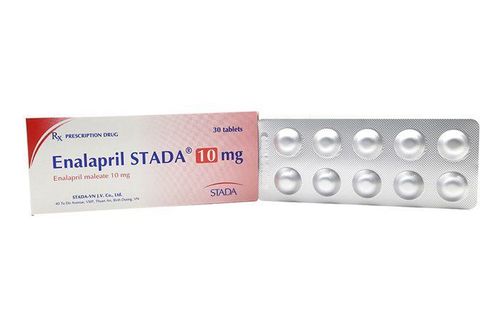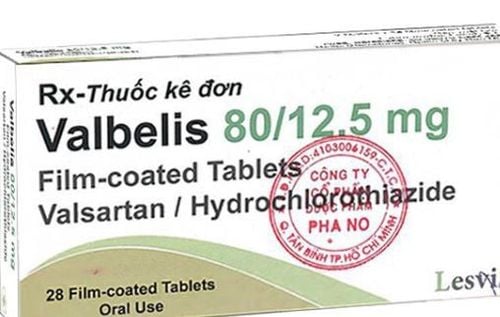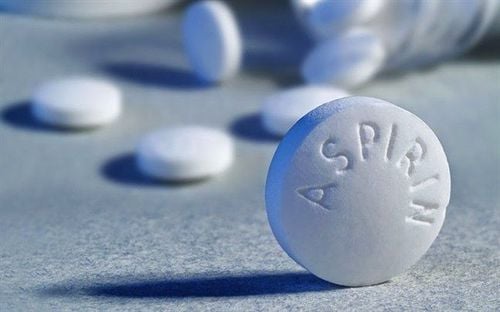This is an automatically translated article.
Meyervas F is an antihypertensive drug with 2 main active ingredients: Hydrochlorothiazide and Valsartan. In order to use the drug effectively, patients need to learn some information about the uses, dosage and notes when using Dopola in the article below.1. What is Meyervas F?
Meyervas F contains 2 main active ingredients: Valsartan 160mg and Hydrochlorothiazide 25mg. Meyervas F is available in the form of film-coated tablets.
Valsartan is an angiotensin II (AT1) type1 receptor antagonist. The AT1 receptor is involved in most actions on the kidney, cardiovascular, and central nervous systems. Valsartan selectively inhibits angiotensin II binding to the AT1 receptor in various tissues, including the adrenal gland and vascular smooth muscle. Valsartan exerts its antihypertensive effect through antagonism of angiotensin II-induced effects (vasoconstriction, increased aldosterone secretion, water reabsorption, increased adrenal and presynaptic catecholamine secretion, and vasopressin release). Hydrochlorothiazide increases sodium chloride excretion and water retention through inhibition of Na+ and Cl- ions reabsorption in the distal tubule. The excretion of other electrolytes, especially K+ and Mg2+, is also increased but Ca2+ is decreased. Hydrochlorothiazide reduces carbonic anhydrase activity, thereby increasing bicarbonate excretion, but this effect is weaker than chloride ion excretion and does not change urine pH significantly. Hydrochlorothiazide may decrease the glomerular filtration rate. Hydrochlorothiazide has a moderate diuretic effect, since about 90% of sodium ions have been reabsorbed before reaching the distal tubule, the main site of action of hydrochlorothiazide. Hydrochlorothiazide has an antihypertensive effect, due to a decrease in plasma and extracellular fluid volume associated with urinary Na+ excretion. Later in the course of hydrochlorothiazide, the antihypertensive effect depends on the decrease in peripheral resistance, through the gradual adaptation of the blood vessels to the decrease in the concentration of Na+ ions. Hydrochlorothiazide enhances the effect of other antihypertensive agents when used concurrently.
2. Indications and contraindications to the drug Meyervas F
Meyervas F is indicated in the treatment of the following cases:
Treatment of hypertension. Treating high blood pressure helps prevent heart attacks, strokes, and kidney problems. Meyervaside F can also be used to treat heart failure. Contraindications:
Meyervas is contraindicated for use in patients with hypersensitivity to Hydrochlorothiazide, Valsartan or any of the excipients.
3. How to take Meyervas F
Meyervas F is taken orally. Take Meyervasid F under the direction of your doctor. Dosage of Meyervas F refer to the following:
Starting dose: 1 Meyervasid F tablet (160mg - 25mg)/time, used once daily. Maintenance dose: Adjust dose as needed (every 1-2 weeks), up to a maximum dose of 2 tablets (320mg - 50mg)/time, administered once daily. Meyervas overdose and management:
Meyervas overdose symptoms include severe hypotension, tachycardia, arrhythmias, myocardial ischemia, circulatory failure which may be accompanied by shock, decreased consciousness. Treatment of Meyervas F drug overdose is mainly symptomatic and supportive. In case of symptoms of drug overdose, it is necessary to stop using the drug and go to a medical facility for timely treatment. What to do when you miss a dose of Meyervas F:
If you forget to take a dose of Meyervas F, take it as soon as possible. If it is almost time for the next dose of Meyervasid F, skip the missed dose and take the next dose as scheduled. Also, do not double the dose of Meyervas F.
4. Undesirable effects of the drug Meyervas F
Serious unwanted effects may be encountered when using Meyervasid F:
Vision problems, eye pain. Feelings of loss of consciousness, weakness, restlessness, confusion, fainting, seizures. Urinating a lot. Tachycardia, palpitations. Swelling, weight gain. Jaundice, yellow eyes, loss of appetite, vomiting, dry mouth. Less serious side effects: Abdominal pain, diarrhea, back pain, headache, dizziness, rash, sore throat, dry cough.
In case of any serious side effects, stop using Meyervas F and go to a medical facility for timely treatment.
5. Precautions while using Meyervas F
Active ingredient Valsartan:
Risk of hypotension: Symptomatic hypotension often occurs with Valsartan in patients with hypovolemia due to the use of high-dose diuretics, on a salt-restricted diet. , diarrhea or vomiting, on hemodialysis. Closely monitor patients during the initiation of valsartan therapy. Patients with heart failure, patients with clinical signs of left ventricular systolic dysfunction after myocardial infarction: There is a high risk of hypotension, so caution should be exercised when using Valsartan in these patients. However, there is no need to stop taking the drug if the dose of valsartan is within the recommended dose range. Monitor renal function of patients during treatment with Valsartan. There is a risk of developing hyperkalemia with the use of Valsartan, especially in patients with heart failure or with concomitant renal failure. Valsartan should not be used concomitantly with potassium-sparing diuretics, drugs with the potential to increase serum potassium levels, or potassium supplements. Periodically monitor serum potassium levels while taking valsartan. Patients with 1 kidney, patients with bilateral renal artery stenosis or unilateral renal artery stenosis: Valsartan should be used with caution because safety has not been established. Use of drugs that inhibit the renin-angiotension-aldosterone system may increase creatinine levels or increase blood urea nitrogen (BUN) in patients with renal artery stenosis. Patients with renal impairment: Valsartan should be used with caution in patients with a glomerular filtration rate < 10 mL/min or on hemodialysis. The decline in renal function associated with the use of valsartan mainly occurs in patients with risk factors such as a history of renal failure, severe heart failure, renal artery stenosis. Valsartan should be used with caution in patients with mitral stenosis, aortic stenosis, and hypertrophic cardiomyopathy. Pregnant women: Valsartan is contraindicated in this population, especially in the second and third trimesters of pregnancy. The use of Meyervas is not recommended during the first 3 months of pregnancy. When pregnancy is detected, the patient being treated with valsartan should immediately discontinue the drug and replace it with another drug. Lactation: Studies in rats have shown that valsartan is excreted in human milk; it is not known whether the drug is excreted in human milk. Because of the risk of adverse effects on the nursing infant, discontinue nursing during treatment or discontinue valsartan and initiate alternative therapy. Active ingredient Hydrochlorothiazide:
Patients taking Hydrochlorothiazide diuretics must be periodically monitored for serum electrolytes and urine, especially patients taking Corticosteroids, ACTH, Quinidine, Digitalis, patients vomiting or receiving fluids. Patients with renal impairment: Hydrochlorothiazide administration carries a risk of increased blood urea nitrogen and further deterioration of renal function. Hepatic impairment: There is an increased risk of hepatic coma with hydrochlorothiazide. Diabetes: When using Hydrochlorothiazide, it is necessary to adjust the dose of antidiabetic drugs including insulin, oral hypoglycemic drugs because the drug can increase blood glucose. Hydrochlorothiazide may increase blood cholesterol and triglycerides. Caution should be exercised in patients with moderate and high blood cholesterol; high blood triglycerides. Elderly patients need to be cautious when taking Hydrochlorothiazide because of the risk of electrolyte imbalance. Systemic lupus erythematosus: May be aggravated by hydrochlorothiazide.
6. Drug interactions
Regarding the active ingredient Valsartan:
Lithium: concomitant use with Meyervas increases the concentration of lithium, leading to lithium toxicity. Closely monitor the patient, monitor for lithium toxicity and plasma lithium concentrations. Angiotensin-converting enzyme inhibitors: Concomitant use of valsartan is not recommended due to the risk of hypotension, renal failure, and increased serum potassium levels. Antihypertensives of the beta-blockers and calcium channel blockers: increased antihypertensive effect when used with Meyervas. Loop Diuretics, Thiazide Diuretics: Symptomatic hypotension may occur upon initiation of valsartan in patients receiving high-dose diuretics. Potassium-sparing diuretics, potassium supplements: Due to the risk of increased serum potassium levels and increased creatinine levels in patients with heart failure, concomitant use of Valsartan is not recommended. Non-Steroidal Anti-Inflammatory Drugs: Caution should be exercised when co-administering Meyervas with decreased blood pressure, increased serum potassium levels, and increased risk of renal failure. Monitor renal function during the initiation of Meyervas therapy and adequately rehydrate patients with volume depletion. In relation to the active substance Hydrochlorothiazide:
Alcohol, Barbiturates or narcotic hypnotics: Use with Hydrochlorothiazide is an increased risk of orthostatic hypotension. Antidiabetic drugs (oral drugs and insulin): Dosage adjustment of these drugs is required because Hydrochlorothiazide increases blood glucose. Other Antihypertensives: Synergistic effect or potentiation of the hypotensive effect of Hydrochlorothiazide. Corticosteroids, carbenoxolone, ACTH, Salbutamol, Amphotericin B or Reboxetin: Increased electrolyte loss when administered with Hydrochlorothiazide, especially hypokalemia. Muscle relaxants: Hydrochlorothiazide may increase the response to muscle relaxants. Non-Steroidal Anti-Inflammatory Drugs: May reduce the diuretic, natriuretic and antihypertensive effects of hydrochlorothiazide in some patients. Quinidine: Concomitant use with Hydrochlorothiazide can cause torsades de pointes, fatal ventricular fibrillation. Hydrochlorothiazide reduces the effect of anticoagulants, drugs used to treat gout. The drug enhances the effect of anesthetics, vitamin D, glycosides. Hydrochlorothiazide increases the toxicity of digitalis, increasing the risk of arrhythmias when used concomitantly with drugs that prolong the QT interval. Allopurinol, Tetracycline: Increased toxicity when used with Hydrochlorothiazide. The above is the reference information about the drug Meyervas F, patients should carefully read the instructions for use and use according to the dose prescribed by the doctor to achieve the best effect.













